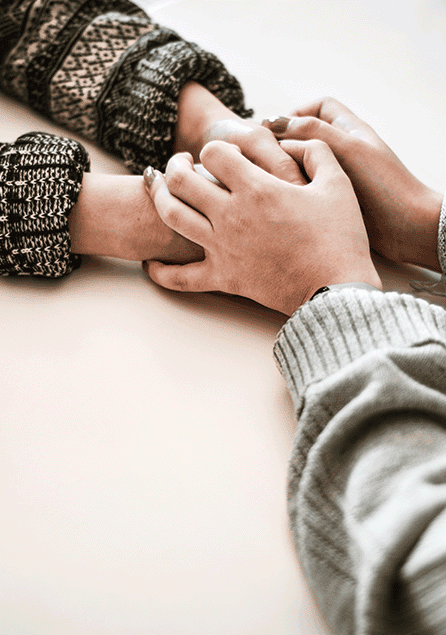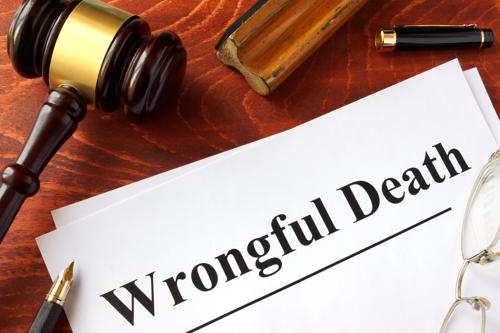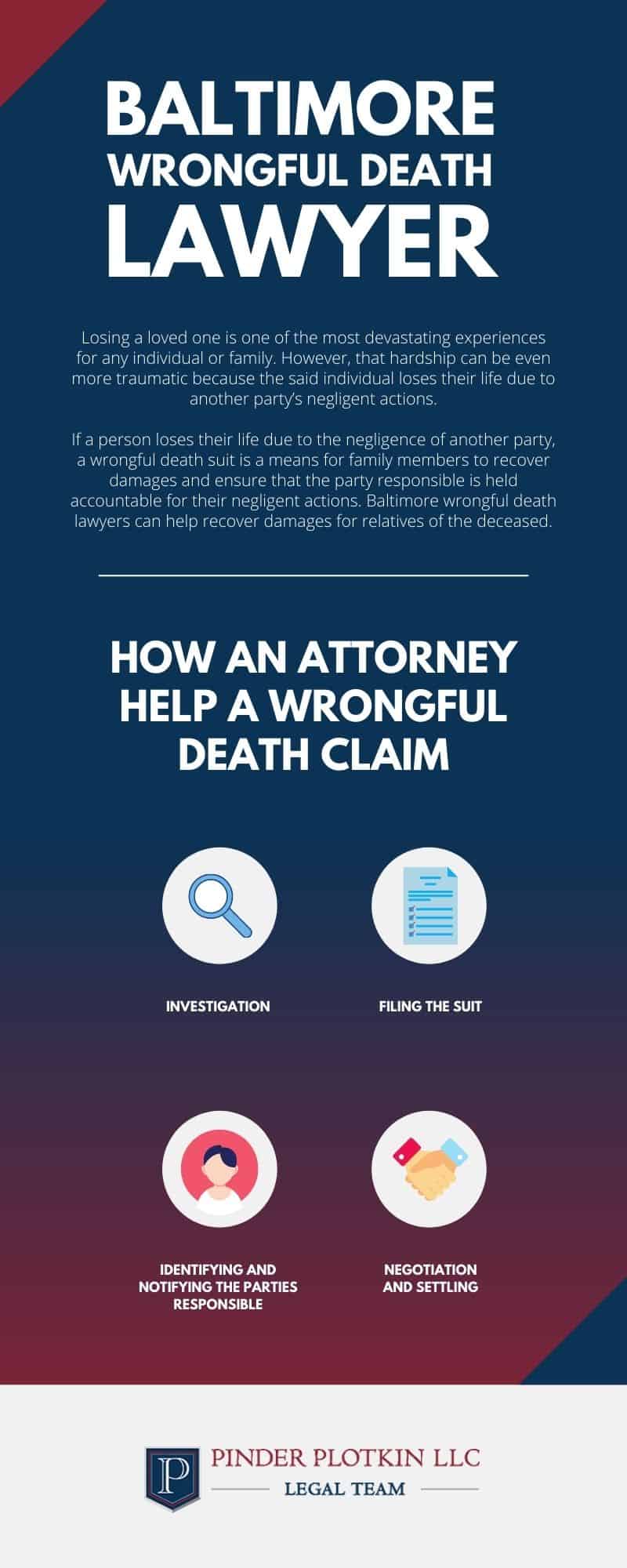Subscribe To Our Newsletter
Menu


If your loved one has been the victim of a wrongful death, contact the personal injury attorneys at Pinder Plotkin. You deserve someone who works as hard as you do to help you with your claim. We realize this is a difficult time for family members, so we try to make this process as simple as possible as you navigate life after the accident. Reach out to Pinder Plotkin so we can discuss your case today.
Wrongful death in Maryland’s Wrongful Death Statute is defined as a death that results from a negligent act of another party, wherein the deceased individual may have brought an action for recovering damages had he/she not passed away. A wrongful death lawsuit is intended to compensate the immediate family and estate of the deceased person whose death was the result of another party’s negligent actions.
The Wrongful Death Statute was created by the Maryland State Legislature to allow the surviving members of the family, or the deceased’s person’s estate, to receive compensation for the loss of their loved one due to another party’s negligent actions. The statute was created because it is the family that’s usually left suffering after the wrongful death of a loved one.
Loss of income, companionship, and protection, broken families, heartache, and missed memories are all ways that surviving family members may be devastated by the wrongful death of a loved one. The family’s right under Maryland’s Wrongful Death Statute is an independent claim that’s separate from any right that the deceased’s estate might also have.
While other states uphold rulings that may allow for damages to be collected even if both parties were at fault, Baltimore’s laws require complete freedom from responsibility for any part of the accident in any personal injury case. Maryland is a state that upholds a Contributory Negligence rule. This means that if a person is at fault, even at the smallest amount of fault, that would be enough to nullify a wrongful death lawsuit and make it impossible to prosecute. The victim in a wrongful death case must have been entirely free of responsibility for the accident that occurred in order for the lawsuit to proceed.
We study all sides of a case to help you prove that negligence lands with the opposing party. If you have concerns about what constitutes a wrongful death suit, contact the lawyers at Pinder Plotkin, and we’ll be happy to answer your questions.
The main part of the wrongful death case will be to prove negligence on the part of the opposition. Negligence can be difficult to claim, and any case will be required to prove if the implied negligence actually led to the cause of death. The Pinder Plotkin legal team carefully examines all documentation, including witness statements and testimony. We gather evidence so we can present a strong case in court.
There are a variety of accidents that may lead to wrongful death lawsuits. Any sort of accident that involves severe or catastrophic injuries that lead to death could result in a wrongful death lawsuit. Some common situations and descriptions of what would meet the required negligence of a wrongful death lawsuit include:
When someone behaves recklessly behind the wheel of a vehicle and an accident that results in death, they can be held responsible for wrongful death. Reckless behaviors can include:
These, and other behaviors, are liable to cause car accidents.
As with any motor vehicle accident, boating accidents can be deadly. Drowning, hypothermia, or collision injuries may result in death. If the driver of the boat was behaving in a way that endangered others, they could be liable for the subsequent death. This includes:
Construction is a dangerous job that can lead to injuries from the tools and heavy machinery needed to perform the tasks. OSHA safety standards are put in place to protect construction employees, but if those standards are ignored or basic safety protocols are not met, injuries or death may occur. Construction accidents that result in wrongful death can include:
While construction workers are the demographic mainly at risk for accidents surrounding construction sites, it is possible that tools, equipment, and construction materials can fall from a construction site and injure or kill someone who is not a construction worker passing below.
Doctors, nurses, and anyone else working in the medical field have an obligation to their patients. They are required to provide a standard of care to their patients to protect their lives. When medical professionals don’t uphold that standard of care and either act in opposition to a client’s best interest or fail to provide appropriate care, their actions may be classified as medical malpractice. The sorts of actions that constitute medical malpractice include:
Medical practitioners who do not thoroughly care for their patients open themselves up to wrongful death lawsuits.
Like the aforementioned medical practitioners, nursing home staff have a duty to the elderly in their care. When they ignore that duty, they may be liable for wrongful death compensation. Negligent actions that constitute nursing home neglect or abuse include:
Not all products are safe for end use or consumption. While quality assurance is supposed to test products for defects thoroughly, that’s not always the case. The manufacturer of defective products that caused your loved one’s death may be liable for your compensation if the product:
Defective product liability lies with the manufacturer.
Fires can quickly get out of control if unsupervised or if lit negligently or maliciously. If your loved one died because of a fire, the perpetrator can be held responsible in court. This could include:
This is not an extensive list of accidents that may result in wrongful death. If you do not see your specific situation here, reach out to the lawyers at Pinder Plotkin so we can talk with you about your potential case.
The company or a coworker may be held liable in a workplace accident that results in death. If the employee who died in the workplace followed all protocols and safety instructions and can be determined to have not been at fault, there may be grounds for a wrongful death lawsuit against the company for creating an unsafe working environment. Some things that may contribute include the following:
At Pinder Plotkin, we take your cases with the utmost seriousness, and we aren’t afraid to go up against negligent companies. We will handle your Baltimore wrongful death case with the gravity and dignity it deserves.
Additionally, we greatly respect the first responders and firefighters that serve the Baltimore community. We understand how much you do in your line of work and the risks you take. If your loved one served this community as a first responder and was killed performing their job, we would be honored to help you with your case.
A wrongful death action is brought on behalf of the survivors of the deceased individual, who include the parents, spouse, and/or children. It is intended to compensate the surviving members of the family for any losses suffered in connection with the untimely death of their loved one, which includes lost companionship, lost wages, lost support, etc.
A survival action is usually brought on behalf of the deceased person’s estate. It compensates the estate for losses it paid, which include medical expenses, burial, and funeral costs, etc. related to death. It also compensates the estate for losses the deceased suffered directly, such as pain and suffering related to the fatal injury or illness.
Baltimore provides very specific rules when it comes to those who are allowed to file a wrongful death claim or survival action. Whether a particular person is allowed to file a claim generally depends on whether they are classified as a “primary” or “secondary” beneficiary.
Primary beneficiaries include surviving children, parents, and the spouse of the deceased individual. If a primary beneficiary is alive, he/she can file a wrongful death claim, a survival claim, or both. If a primary beneficiary brings either of the claims, any damages awarded in the claim will be awarded solely to the primary beneficiary.
Secondary beneficiaries include the surviving siblings, nieces, nephews, cousins, and other relatives of the deceased. If there aren’t any primary beneficiaries or no primary beneficiaries are willing to bring either type of claim to court, secondary beneficiaries can file a survival action seeking damages on behalf of the deceased person’s estate.
Survival actions are filed on behalf of the deceased. They operate under the assumption that, had the person survived, they would have brought a lawsuit for the injuries or damages rendered unto them. This means that the injuries the deceased received that resulted in their death are taken into account and can be compensated for.
Wrongful death is a case brought by direct family members who have survived the deceased. This case considers what the deceased left behind, namely, family members that were directly affected by their loved one’s loss and were dependent on the income. It covers emotional and financial damages. It also covers funeral costs and medical expenses.
Economic damages include the financial damages that are incurred directly from the incident that led to the fatality as well as the loss of future financial contributions by the deceased person. The different economic damages are as follows:
Note: Maryland has no limit on the amount of economic damages that can be recovered. However, there’s a cap on non-economic damages. The cap on non-economic damages, however, increases by $15,000 every year. As of 2022, the maximum recovery is $920,000.
Non-economic damages include less tangible losses, which have to do with social and emotional needs and can be hard to quantify financially. These damages are often met with greater rewards. The various non-economic damages include the following:
Note: Maryland has no limit on the amount of economic damages that can be recovered. However, there’s a cap on the non-economic damages. The cap on non-economic damages, however, increases by $15,000 every year. As of October 1, 2020, the maximum recovery will be $890,000.
As stated before, the fault must clearly sit with the person or company who is accused of causing the death of the victim in a wrongful death lawsuit in Maryland. Contributory negligence by the deceased must be ruled out in order to proceed.
The Pinder Plotkin legal team goes about proving the fault of the opposing party by investigating all angles of the accident and the circumstances surrounding it. We look at police reports taken at the time of the accident. We also collect evidence that proves the defendant was negligent towards the deceased. For example, if the accident happened due to a car crash, we may research the speed of the cars and whether the driver was under the influence of any altering substances. The above actions help us prove that your loved one was not at fault for the accident.
Punitive damages may be available in wrongful death claims in Baltimore, but to win an award for such damages, the responsible party generally has to act with the intent to cause injury. This includes malice and being motivated by a malicious or wrongful motive to kill or injure another person. This can be a high standard to meet in wrongful death claims involving only negligence, which is why it is very rare for a jury to award punitive damages in Baltimore.
The plaintiff is required to establish that the defendant owed the deceased individual some duty of care. For instance, driving on a public road means that the driver has a duty to follow the rules of the road and drive safely.
The plaintiff in a wrongful death claim is also required to prove that the actions or inactions of the defendant breached the duty of care, such as running a red light.
The plaintiff is also required to prove that the defendant’s breach of their duty of care is what ultimately led to the wrongful death.
A wrongful death claim in Baltimore starts essentially like any other personal injury claim: It is triggered by the negligent action or actions of another party that leads to a person’s death. It is up to the surviving family members of the deceased or his/her estate that chooses when to involve a wrongful death lawyer.
If your loved one has recently lost his/her life in Baltimore due to the negligent actions of another party, you need to get in touch with reputable attorneys at Pinder Plotkin to allow our team to properly investigate the claim and advise you on what you should expect throughout the course of the wrongful death claim.
It doesn’t happen in every case, but in most cases, the party that you plan to file the lawsuit against will attempt to solve the matter out of court. Much of the negotiation will be handled by our lawyers at Pinder Plotkin, who will consult with you about important decisions.
Our team of lawyers will next identify any and all parties believed to be responsible for the death and notify them of the intent to file the lawsuit.
The team at Pinder Plotkin made up of lawyers and experts will investigate the facts surrounding what caused the death.
If the negotiations don’t prove fruitful, our lawyers at Pinder Plotkin will move to file a wrongful death lawsuit, which starts when a Complaint or Writ of Summons is filed, which is done through the courthouse. All the named defendants will be served with this information.
Statutes of limitations place a timeframe in which a lawsuit can be filed against an injury or death. If a claim is filed after a set amount of time, it will most often be thrown out.
In Maryland, the statute of limitations for wrongful death lawsuits is three years. This means that you have 36 months from the time of death to bring a lawsuit of wrongful death forward. While this may seem like a lot of time, we urge you to reach out to Pinder Plotkin as soon as you can so that we can get started on your case and deal with the details.
Wrongful death actions and survival actions are usually complex and can take a serious emotional toll on the deceased individual’s loved ones. The pain of losing a loved one is hard enough, and adding on a difficult civil matter that may branch off in a different direction can often prove to be too much to handle without a lawyer that specializes in wrongful death claims being involved.
If your loved one suffered a fatality due to the reckless, negligent, or intentional act of another, you should get in touch with the Baltimore injury law firm of Pinder Plotkin by calling us at the number provided or by filling out our contact form. We will discuss your loss and outline the legal options available to you at your free initial consultation.
 A survival action is usually brought on behalf of the deceased person’s estate. It compensates the estate for losses it paid, which include medical expenses, burial, and funeral costs, etc. related to death. It also compensates the estate for losses the deceased suffered directly, such as pain and suffering related to the fatal injury or illness.
A survival action is usually brought on behalf of the deceased person’s estate. It compensates the estate for losses it paid, which include medical expenses, burial, and funeral costs, etc. related to death. It also compensates the estate for losses the deceased suffered directly, such as pain and suffering related to the fatal injury or illness.

Note: Maryland has no limit on the amount of economic damages that can be recovered. However, there’s a cap on the non-economic damages. The cap on non-economic damages, however, increases by $15,000 every year. As of October 1, 2020, the maximum recovery will be $890,000.
 The following is a brief breakdown of the steps involved:
The following is a brief breakdown of the steps involved: